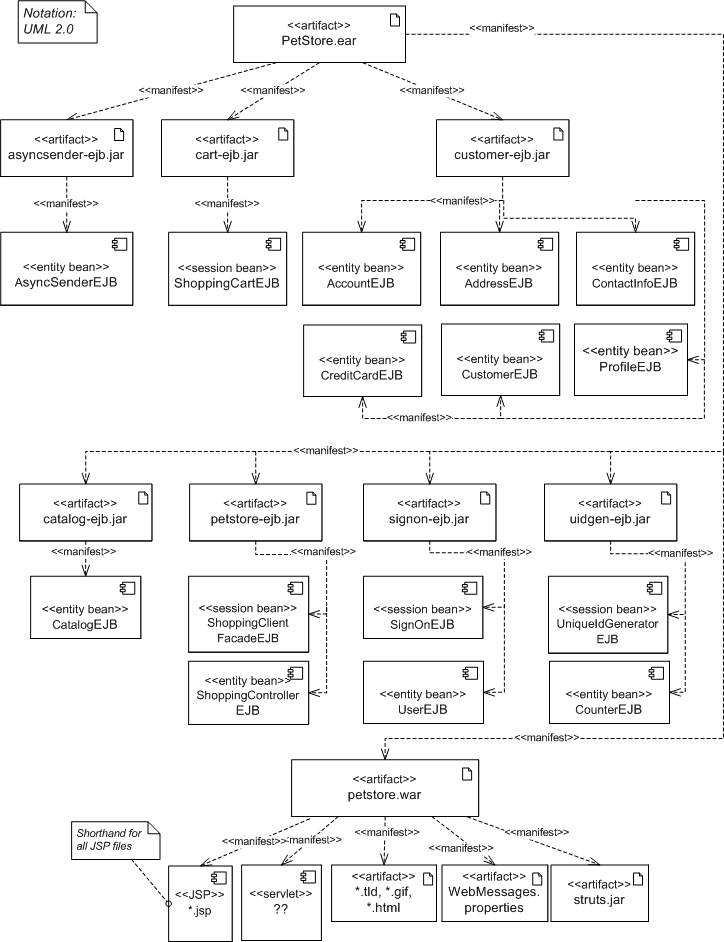
Contents
Primary Presentation
Diagram 1, UML Notation
Diagram 2, Informal Notation
Element Catalog
PetStore.ear, PetStore.war
Files that can be set in different machines.
<any name>.jar
bean library
AccountEJB
Tracks account status, credit card, and contact info. Entity bean. Belongs to customer-ejb.jar
AddressEJB
Tracks two lines of street address, state, zip code, and countryEntity bean that keeps the information related to address from the customer. Entity bean. Belongs to customer-ejb.jar
AsyncSenderEJB
Entity bean. Belongs to asyncSender-ejb.jar
CatalogEJB
Session Bean implementation of Catalog. Belongs to catalog-ejb.jar
CreditCardEJB
Tracks card number, card type, and expiration date. Entity bean. Belongs to customer-ejb.jar
ContactInfoEJB
Tracks family and given name, telephone, email, and address. Entity bean. Belongs to customer-ejb.jar
CounterEJB
represents a counter with a specific prefix; used only by UniqueIdGeneratorEJB to manage series of unique numbers. Session bean. Belongs to uidgen-ejb.jar
CustomerInfoEJB
Tracks customer ID (primary key), account, and profile. Entity bean. Belongs to customer-ejb.jar
ProfileEJB
Tracks preferred language, category, list preference, and banner preference. Entity bean. Belongs to customer-ejb.jar
ShoppingCartLocalEJB
This class represents the implementation of shopping cart as a Session EJB. Belongs to cart-ejb.jar
ShoppingClientFacadeLocalEJB
Provides a fa�§ade to all of the ejbs related to a shopping client. It is part of petstore-ejb.jar
ShoppingControllerEJB
Session Bean implementation for EJBController EJB. See the StateMachine for more details. Belongs to petstore-ejb.jar
SignOnEJB
Checks if a user is allowed to sign on or to create new users. Entity bean. Belongs to signon-ejb.jar
UniqueIdGeneratorEJB
Session Bean. Belongs to uidgen-ejb.jar
UserEJB
Represents a user who may sign on to the system; tracks a user name and password. Session bean. Belongs to signon-ejb.jar
StateMachine
Responsible for processing Events received from the client tier. As part of the WAF framework the events are generated by web actions.
The State Machine ties all EJB components together dynamically at runtime thus providing support for reusable components.
The mapping of the event names to handlers is mangaged by the JNDI key contained in Event:getEventName() which is looked up from an environment entry located in the EJB Deployment descriptor of the EJBClientController. A second option to event handling is to do so in the XML file.
Variability Guide
An alternative could be to have separate files for each jar file, allowing the application to be more distributed in more machines. On the other hand, having them in one file promotes performance since then connection time between beans from different libraries will be saved. This interaction is frequent and would create a big overhead.
Other Information
TBD
Related Views
- Parent. None
- Petstore Data Model View - petstoredb

